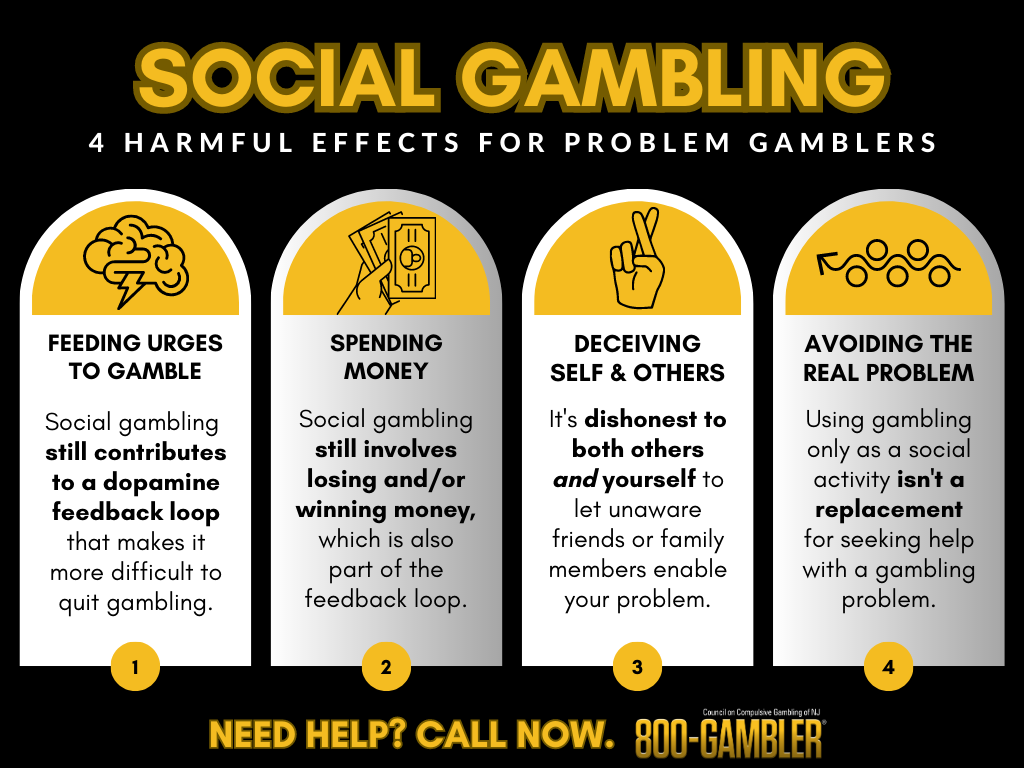Sometimes, it’s easy to brush off problematic behavior when you only do it in the presence of others. Much like how a social drinker can convince themself that they are not an alcoholic because they only drink with friends, it can be easy for someone who struggles with problem gambling to use the same justification.
Whether or not your gambling habits change based on the presence of other people, it’s important to remember that you can still develop a gambling problem if you only gamble socially. Here’s what problem gamblers, their family and friends, and the general public should know about this so-called “social gambling.”

You’re Still Feeding Your Urges
It can be easy to convince yourself that because you’re gambling with friends, you’re engaging in a social activity. However, the core fact remains that if you struggle with a gambling disorder, this seemingly normal “social activity” is far from harmless. When people have an urge to gamble, the “lows and highs” of gambling provide a dopamine high. Before you know it, you could end up maxing out credit cards, lying to friends and family members, and spending all night spinning the wheel, all because you’re trying to get back the cash you’ve already spent a hundred times over.
You’re Still Spending Money
Money you lose while gambling is always lost money, no matter who you lose it with. While many people who don’t have gambling problems are willing to accept losing a bit of cash in exchange for a fun night out, people with signs of a gambling problem should avoid spending their money on gambling altogether. In fact, you can stil have a gambling problem even if you keep winning.
You’re Deceiving Others — And Yourself
Many problem gamblers’ fixation on winning causes financial issues, relationship problems, and even job loss. However, because there aren’t as many physical signs and side effects for problem gamblers as there are for people with substance use disorders, a problem gambler can seem totally normal in a group setting.
If you use social activities as an excuse to gamble, it’s important to ask yourself, “Would my trusted friends or family members still want to be spending time with me in this setting if they knew I struggled with a gambling problem?” If you haven’t fessed up to your problem yet, it’s deceptive to both your loved ones and yourself to continue using social outings as a reason to gamble. (See also: “Can you ban yourself from a casino?”)
You’re Still Avoiding the Problem
By restricting your gambling activities to “only with friends,” rather than attempting to stop gambling altogether, you’re just slapping a band-aid over a potentially serious wound. Most people engage in problem gambling to escape the troubles of everyday life, attempt to recoup financial losses, or simply provide their brains with stimulation.
No matter how the behavior ends up becoming a problem, once you’re hooked on gambling, your brain will reward you for doing so, which is part of why it’s so hard to quit. In order to rewire your brain’s reward system, you’ll need to seek out resources such as GA meetings and mental health care rather than continuing to engage in the behavior that has been harming you the entire time.
Get Help Now
If you have a gambling problem, it’s time to take back your life. 800-GAMBLER is a toll-free, confidential helpline operated 24/7 by trained staff. Call 800-GAMBLER today or use our text chat line to contact us anytime. We’re here, and we’re always ready to hear from you.



